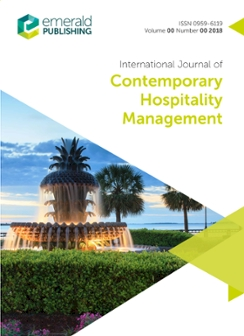Table of contents
The meaning of hospitality: do employees understand?
Maria Golubovskaya, Richard N.S. Robinson, David SolnetThis paper explores how hospitality frontline employees understand, interpret and practice “hospitality” in a hotel industry context.
Investigating an innovative service with hospitality robots
Chun-Min Kuo, Li-Cheng Chen, Chin-Yao TsengThe purpose of this study is to identify the factors that influence the development of service robots, and to apply a service innovation strategic mindset to the hotel industry in…
Conceptualising tourist experiences with new attractions: the case of escape rooms
Tomaz KolarThe purpose of this paper is to theoretically and empirically explore tourist experiences with the niche-like, yet global phenomenon of escape room attractions.
The impact of green experience on customer satisfaction: evidence from TripAdvisor
Yixiu Yu, Xu Li, Tun-Min (Catherine) JaiThe purpose of this paper is to examine guests’ experiences at green hotels and the impact of green experience on customer satisfaction.
Occupational identity and culture: the case of Michelin-starred chefs
John Cooper, Charalampos Giousmpasoglou, Evangelia MarinakouThe purpose of this study is to conceptualise how the occupational identity and culture of chefs is constructed and maintained through both work and social interaction.
Customer relationship management (people, process and technology) and organisational culture in hotels: Which traits matter?
Roya RahimiThe purpose of this study is to examine the impact of four organisational cultural traits of adaptability, consistency, involvement and mission on the three components of customer…
Exploring jaycustomer behavior and handling approach in casinos
Lawrence Hoc Nang Fong, Amy Siu Ian So, Rob LawThis paper aims to uncover various types of jaycustomer behaviors, causes of the behaviors and employees’ handling approaches in casinos, which is an underresearched sector in the…
Clustering benefits for upscale urban hotels
Ainhoa Urtasun, Isabel GutiérrezThe aim of this paper is twofold. First, clustering patterns of urban hotels are explored, and, second, clustering effects on performance for upscale urban hotels are estimated.
Person–environment fit and its effects on employees’ emotions and self-rated/supervisor-rated performances: The case of employees in luxury hotel restaurants
Yong-Ki Lee, Soon-Ho Kim, Min-Seong Kim, Ho-Seok KimSeeking to build a deeper understanding of a higher level of hospitality in terms of employee task performance, this study aimed to explore different person–environment (P–E) fit…
Segmenting customers by participation: An innovative path to service excellence
Sandy C. Chen, Carola Raab, Sarah TanfordThis study aims to report the results of a survey of diners’ behavior during production and consumption of dining services with three objectives. The first objective is to create…
Periodicity analysis and a model structure for consumer behavior on hotel online search interest in the US
Juan Liu, Xue Li, Ya GuoThis paper aims to analyze and model consumer behavior on hotel online search interest in the USA.
Examining the determinants of long-term debt in the US restaurant industry: Does CEO overconfidence affect debt maturity decisions?
Kwanglim Seo, Ellen Eun Kyoo Kim, Amit SharmaThis paper aims to find alternative explanations for the use of long-term debt in the US restaurant industry from a behavioral perspective. The three-fold purpose of the present…

ISSN:
0959-6119Online date, start – end:
1989Copyright Holder:
Emerald Publishing LimitedOpen Access:
hybridEditor:
- Prof Fevzi Okumus